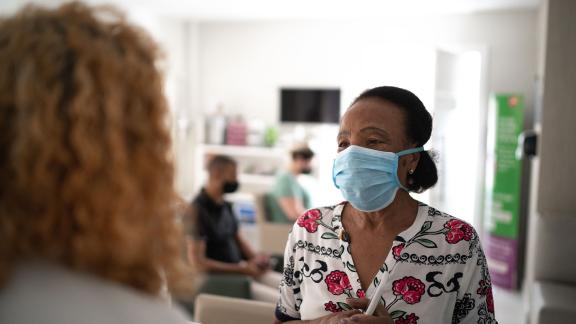Latest winter situation report underlines the pressures NHS leaders, their staff and patients are enduring

The latest winter situation report shows:
- Flu cases in hospital jumped up by almost a half (47%) last week, with 5,105 patients with flu in general and acute hospital beds, up from 3,479 the previous week.
- The number of patients with Covid in hospital rose by almost 1,200 on the previous week, with an average of 9,390 patients in hospital with Covid every day.
- NHS 111 answered the second highest number of calls ever in a week, with 410,618 calls answered, up from 365,258 last week and 382,021 last year - a level of demand which has not been seen since the start of the Covid pandemic.
- Hospital bed occupancy remains high, with more than nine in ten beds (93%) occupied.
- There are 12,809 patients occupying hospital beds who were medically fit to be discharged.
- 7,836 hours were lost to handover delays on an average day, nearly 55,000 in a week.
Responding to the latest winter situation report for urgent and emergency care, Matthew Taylor chief executive of the NHS Confederation, said:
“The latest winter situation report underlines the stark reality of the pressures that NHS leaders, their staff and patients are enduring. As they wearily enter a new year, our members say they continue to manage crisis conditions with inherent risks to patient safety as the prospect of sustained industrial action looms large.
“It is very concerning to see that the number of people in hospital with flu has risen by nearly 50 per cent in the last week and that Covid cases also continue to rise, as staff in NHS 111 answered a near record number of calls – a level of demand which has not been seen since the start of the Covid pandemic.
"We are grateful for the public support at this difficult time and call on them to try to minimise the risk of disease transmission by being fully vaccinated, to use services responsibly and to appreciate the pressures NHS staff are working under.
“Hospital bed occupancy remains high, with more than 90 per cent of beds occupied and discharge delays show no sign of waning as 13,000 people who are medically fit unable to do so due in part due to a dearth lack of social care support. This means that unfortunately we will continue to see patients held in hospital corridors as they wait for a bed to become free, ambulances queuing outside of hospitals which will lengthen waiting times and the danger of more patients being discharged into inappropriate settings because hospitals are desperate to free up beds.
“Yet, against this backdrop the NHS continues to deliver for its patients, including slashing the list of patients who have been waiting for elective procedures and patients waiting 78 weeks, as well as driving improvements in cancer waits and utilising virtual wards so more people can be cared for in the community. The leaders we speak to are pulling out all the stops in local integration and innovation, but sadly the impact is only marginal in the face of the fundamental capacity gap.
“We must learn the harsh lessons of this winter and Government must commit to giving the health and care system the tools and support it needs to avoid next winter being as bad as this one. Critical to that is rapid action to address the worsening workforce crisis in health and care, as a first and vital step, and reaching a compromise with the unions to stop this damaging industrial action.”



